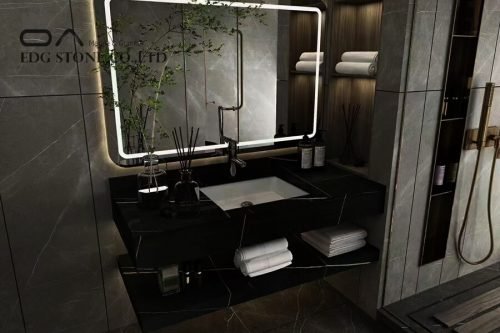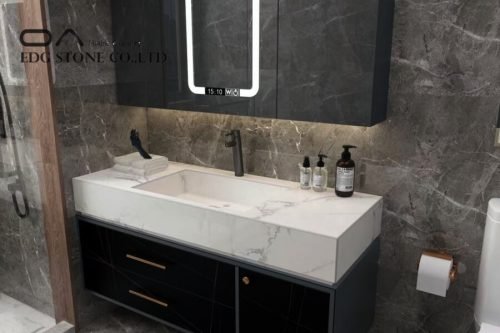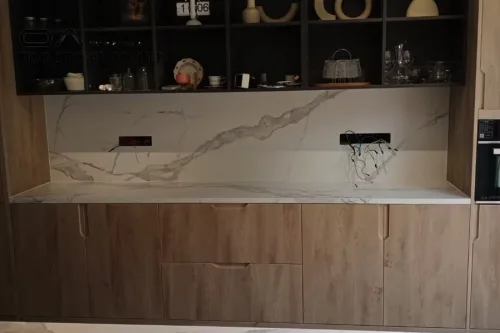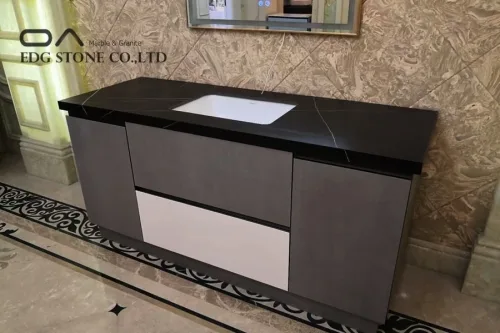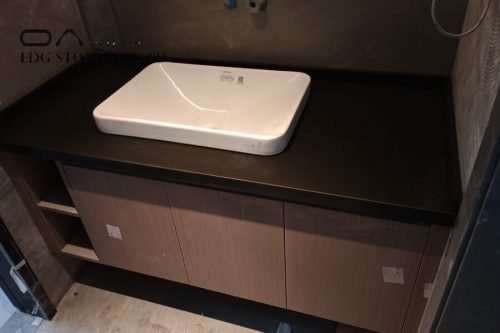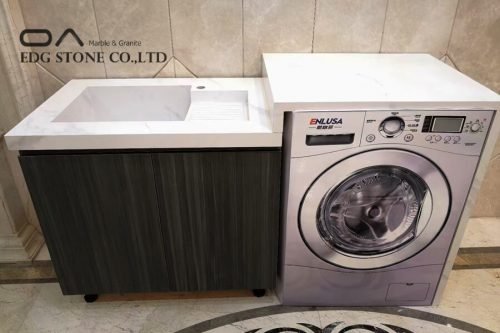Porcelain is a heat- and scratch-resistant countertop material that’s quickly becoming a go-to in home renovation. It’s versatile and easy to maintain, making it a great option.
 The porcelain bathroom vanity tops - What is a porcelain countertop Before understanding the shortcomings of a porcelain countertop, let's first understand what a porcelain countertop is? The porcelain is made of natural stone and inorganic clay through a special process, using advanced vacuum extrusion equipment and a fully automatic closed computer It is a new type of ceramic sheet fired in a temperature-controlled roller kiln at 1200 degrees. The existing maximum size is 3600*1200mm, and it weighs only 7kg per square meter. Although the thickness of the porcelain countertop is thin, it is very strong, not easy to scratch, and it can cut vegetables directly on it. 1. Light: The average weight of traditional tiles is 23-27kgs/m2, while the average weight of ultra-thin porcelain is only 7kgs/m2.
The porcelain bathroom vanity tops - What is a porcelain countertop Before understanding the shortcomings of a porcelain countertop, let's first understand what a porcelain countertop is? The porcelain is made of natural stone and inorganic clay through a special process, using advanced vacuum extrusion equipment and a fully automatic closed computer It is a new type of ceramic sheet fired in a temperature-controlled roller kiln at 1200 degrees. The existing maximum size is 3600*1200mm, and it weighs only 7kg per square meter. Although the thickness of the porcelain countertop is thin, it is very strong, not easy to scratch, and it can cut vegetables directly on it. 1. Light: The average weight of traditional tiles is 23-27kgs/m2, while the average weight of ultra-thin porcelain is only 7kgs/m2. The porcelain vanity sink tops - What is a porcelain countertop Before understanding the shortcomings of a porcelain countertop, let's first understand what a porcelain countertop is? The porcelain is made of natural stone and inorganic clay through a special process, using advanced vacuum extrusion equipment and a fully automatic closed computer It is a new type of ceramic sheet fired in a temperature-controlled roller kiln at 1200 degrees. The existing maximum size is 3600*1200mm, and it weighs only 7kg per square meter. Although the thickness of the porcelain countertop is thin, it is very strong, not easy to scratch, and it can cut vegetables directly on it. 1. Light: The average weight of traditional tiles is 23-27kgs/m2, while the average weight of ultra-thin porcelain is only 7kgs/m2.
The porcelain vanity sink tops - What is a porcelain countertop Before understanding the shortcomings of a porcelain countertop, let's first understand what a porcelain countertop is? The porcelain is made of natural stone and inorganic clay through a special process, using advanced vacuum extrusion equipment and a fully automatic closed computer It is a new type of ceramic sheet fired in a temperature-controlled roller kiln at 1200 degrees. The existing maximum size is 3600*1200mm, and it weighs only 7kg per square meter. Although the thickness of the porcelain countertop is thin, it is very strong, not easy to scratch, and it can cut vegetables directly on it. 1. Light: The average weight of traditional tiles is 23-27kgs/m2, while the average weight of ultra-thin porcelain is only 7kgs/m2. The porcelain vanity top - What is a porcelain countertop Before understanding the shortcomings of a porcelain countertop, let's first understand what a porcelain countertop is? The porcelain is made of natural stone and inorganic clay through a special process, using advanced vacuum extrusion equipment and a fully automatic closed computer It is a new type of ceramic sheet fired in a temperature-controlled roller kiln at 1200 degrees. The existing maximum size is 3600*1200mm, and it weighs only 7kg per square meter. Although the thickness of the porcelain countertop is thin, it is very strong, not easy to scratch, and it can cut vegetables directly on it. 1. Light: The average weight of traditional tiles is 23-27kgs/m2, while the average weight of ultra-thin porcelain is only 7kgs/m2.
The porcelain vanity top - What is a porcelain countertop Before understanding the shortcomings of a porcelain countertop, let's first understand what a porcelain countertop is? The porcelain is made of natural stone and inorganic clay through a special process, using advanced vacuum extrusion equipment and a fully automatic closed computer It is a new type of ceramic sheet fired in a temperature-controlled roller kiln at 1200 degrees. The existing maximum size is 3600*1200mm, and it weighs only 7kg per square meter. Although the thickness of the porcelain countertop is thin, it is very strong, not easy to scratch, and it can cut vegetables directly on it. 1. Light: The average weight of traditional tiles is 23-27kgs/m2, while the average weight of ultra-thin porcelain is only 7kgs/m2. The porcelain vanity top with integrated sink - What is a porcelain countertop Before understanding the shortcomings of a porcelain countertop, let's first understand what a porcelain countertop is? The porcelain is made of natural stone and inorganic clay through a special process, using advanced vacuum extrusion equipment and a fully automatic closed computer It is a new type of ceramic sheet fired in a temperature-controlled roller kiln at 1200 degrees. The existing maximum size is 3600*1200mm, and it weighs only 7kg per square meter. Although the thickness of the porcelain countertop is thin, it is very strong, not easy to scratch, and it can cut vegetables directly on it. 1. Light: The average weight of traditional tiles is 23-27kgs/m2, while the average weight of ultra-thin porcelain is only 7kgs/m2.
The porcelain vanity top with integrated sink - What is a porcelain countertop Before understanding the shortcomings of a porcelain countertop, let's first understand what a porcelain countertop is? The porcelain is made of natural stone and inorganic clay through a special process, using advanced vacuum extrusion equipment and a fully automatic closed computer It is a new type of ceramic sheet fired in a temperature-controlled roller kiln at 1200 degrees. The existing maximum size is 3600*1200mm, and it weighs only 7kg per square meter. Although the thickness of the porcelain countertop is thin, it is very strong, not easy to scratch, and it can cut vegetables directly on it. 1. Light: The average weight of traditional tiles is 23-27kgs/m2, while the average weight of ultra-thin porcelain is only 7kgs/m2. The Sintered stone bathroom - What is a porcelain countertop Before understanding the shortcomings of a porcelain countertop, let's first understand what a porcelain countertop is? The porcelain is made of natural stone and inorganic clay through a special process, using advanced vacuum extrusion equipment and a fully automatic closed computer It is a new type of ceramic sheet fired in a temperature-controlled roller kiln at 1200 degrees. The existing maximum size is 3600*1200mm, and it weighs only 7kg per square meter. Although the thickness of the porcelain countertop is thin, it is very strong, not easy to scratch, and it can cut vegetables directly on it. 1. Light: The average weight of traditional tiles is 23-27kgs/m2, while the average weight of ultra-thin porcelain is only 7kgs/m2.
The Sintered stone bathroom - What is a porcelain countertop Before understanding the shortcomings of a porcelain countertop, let's first understand what a porcelain countertop is? The porcelain is made of natural stone and inorganic clay through a special process, using advanced vacuum extrusion equipment and a fully automatic closed computer It is a new type of ceramic sheet fired in a temperature-controlled roller kiln at 1200 degrees. The existing maximum size is 3600*1200mm, and it weighs only 7kg per square meter. Although the thickness of the porcelain countertop is thin, it is very strong, not easy to scratch, and it can cut vegetables directly on it. 1. Light: The average weight of traditional tiles is 23-27kgs/m2, while the average weight of ultra-thin porcelain is only 7kgs/m2. The Sintered stone bathroom countertop - What is a porcelain countertop Before understanding the shortcomings of a porcelain countertop, let's first understand what a porcelain countertop is? The porcelain is made of natural stone and inorganic clay through a special process, using advanced vacuum extrusion equipment and a fully automatic closed computer It is a new type of ceramic sheet fired in a temperature-controlled roller kiln at 1200 degrees. The existing maximum size is 3600*1200mm, and it weighs only 7kg per square meter. Although the thickness of the porcelain countertop is thin, it is very strong, not easy to scratch, and it can cut vegetables directly on it. 1. Light: The average weight of traditional tiles is 23-27kgs/m2, while the average weight of ultra-thin porcelain is only 7kgs/m2.
The Sintered stone bathroom countertop - What is a porcelain countertop Before understanding the shortcomings of a porcelain countertop, let's first understand what a porcelain countertop is? The porcelain is made of natural stone and inorganic clay through a special process, using advanced vacuum extrusion equipment and a fully automatic closed computer It is a new type of ceramic sheet fired in a temperature-controlled roller kiln at 1200 degrees. The existing maximum size is 3600*1200mm, and it weighs only 7kg per square meter. Although the thickness of the porcelain countertop is thin, it is very strong, not easy to scratch, and it can cut vegetables directly on it. 1. Light: The average weight of traditional tiles is 23-27kgs/m2, while the average weight of ultra-thin porcelain is only 7kgs/m2. The Sintered stone vanity - What is a porcelain countertop Before understanding the shortcomings of a porcelain countertop, let's first understand what a porcelain countertop is? The porcelain is made of natural stone and inorganic clay through a special process, using advanced vacuum extrusion equipment and a fully automatic closed computer It is a new type of ceramic sheet fired in a temperature-controlled roller kiln at 1200 degrees. The existing maximum size is 3600*1200mm, and it weighs only 7kg per square meter. Although the thickness of the porcelain countertop is thin, it is very strong, not easy to scratch, and it can cut vegetables directly on it. 1. Light: The average weight of traditional tiles is 23-27kgs/m2, while the average weight of ultra-thin porcelain is only 7kgs/m2.
The Sintered stone vanity - What is a porcelain countertop Before understanding the shortcomings of a porcelain countertop, let's first understand what a porcelain countertop is? The porcelain is made of natural stone and inorganic clay through a special process, using advanced vacuum extrusion equipment and a fully automatic closed computer It is a new type of ceramic sheet fired in a temperature-controlled roller kiln at 1200 degrees. The existing maximum size is 3600*1200mm, and it weighs only 7kg per square meter. Although the thickness of the porcelain countertop is thin, it is very strong, not easy to scratch, and it can cut vegetables directly on it. 1. Light: The average weight of traditional tiles is 23-27kgs/m2, while the average weight of ultra-thin porcelain is only 7kgs/m2. The Sintered stone vanity top - What is a porcelain countertop Before understanding the shortcomings of a porcelain countertop, let's first understand what a porcelain countertop is? The porcelain is made of natural stone and inorganic clay through a special process, using advanced vacuum extrusion equipment and a fully automatic closed computer It is a new type of ceramic sheet fired in a temperature-controlled roller kiln at 1200 degrees. The existing maximum size is 3600*1200mm, and it weighs only 7kg per square meter. Although the thickness of the porcelain countertop is thin, it is very strong, not easy to scratch, and it can cut vegetables directly on it. 1. Light: The average weight of traditional tiles is 23-27kgs/m2, while the average weight of ultra-thin porcelain is only 7kgs/m2.
The Sintered stone vanity top - What is a porcelain countertop Before understanding the shortcomings of a porcelain countertop, let's first understand what a porcelain countertop is? The porcelain is made of natural stone and inorganic clay through a special process, using advanced vacuum extrusion equipment and a fully automatic closed computer It is a new type of ceramic sheet fired in a temperature-controlled roller kiln at 1200 degrees. The existing maximum size is 3600*1200mm, and it weighs only 7kg per square meter. Although the thickness of the porcelain countertop is thin, it is very strong, not easy to scratch, and it can cut vegetables directly on it. 1. Light: The average weight of traditional tiles is 23-27kgs/m2, while the average weight of ultra-thin porcelain is only 7kgs/m2. The white porcelain vanity top - What is a porcelain countertop Before understanding the shortcomings of a porcelain countertop, let's first understand what a porcelain countertop is? The porcelain is made of natural stone and inorganic clay through a special process, using advanced vacuum extrusion equipment and a fully automatic closed computer It is a new type of ceramic sheet fired in a temperature-controlled roller kiln at 1200 degrees. The existing maximum size is 3600*1200mm, and it weighs only 7kg per square meter. Although the thickness of the porcelain countertop is thin, it is very strong, not easy to scratch, and it can cut vegetables directly on it. 1. Light: The average weight of traditional tiles is 23-27kgs/m2, while the average weight of ultra-thin porcelain is only 7kgs/m2.
The white porcelain vanity top - What is a porcelain countertop Before understanding the shortcomings of a porcelain countertop, let's first understand what a porcelain countertop is? The porcelain is made of natural stone and inorganic clay through a special process, using advanced vacuum extrusion equipment and a fully automatic closed computer It is a new type of ceramic sheet fired in a temperature-controlled roller kiln at 1200 degrees. The existing maximum size is 3600*1200mm, and it weighs only 7kg per square meter. Although the thickness of the porcelain countertop is thin, it is very strong, not easy to scratch, and it can cut vegetables directly on it. 1. Light: The average weight of traditional tiles is 23-27kgs/m2, while the average weight of ultra-thin porcelain is only 7kgs/m2.



